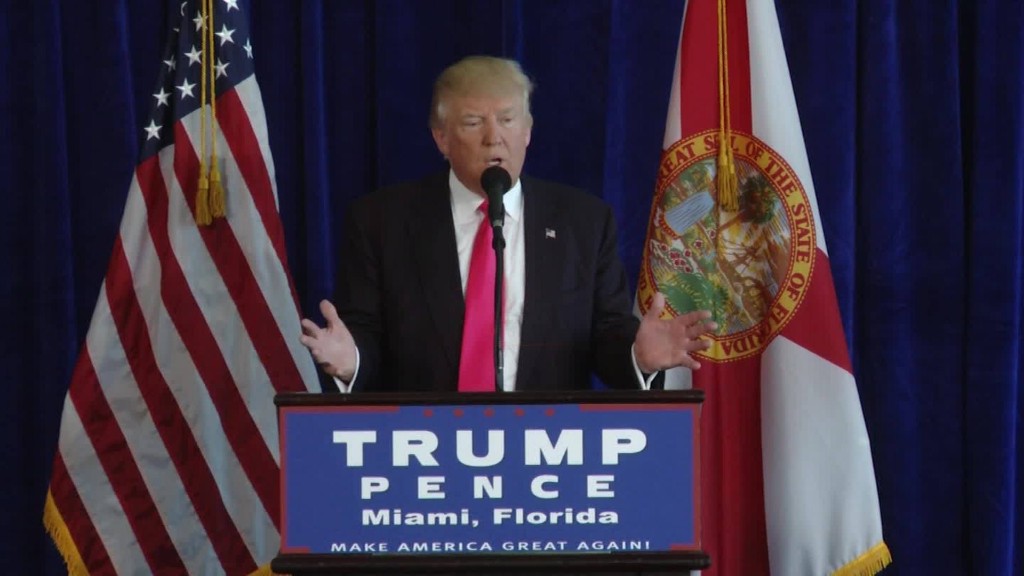
The Trump administration stopped short of branding China and Germany currency manipulators, despite having accused both countries of keeping their currencies artificially low to gain unfair advantage in trade with the U.S.
On Friday, the Treasury Department issued its first report on the currency practices of America's trading partners. The twice-a-year document is required by law.
Trump's Treasury took the same route as the Obama administration did last year, putting Germany and China on watch for potential problems. All told, it put six trading partners on watch, along with Japan, Korea, Switzerland and Taiwan.
All six countries had been named by Obama's Treasury Department as well.
"Expanding trade in a way that is freer and fairer for all Americans requires that other economies avoid unfair currency practices, and we will continue to monitor this carefully," Treasury Secretary Steven Mnuchin said in a statement.
Related: Merkel to Trump adviser - We're not manipulating the euro
The promise of restoring American jobs by cutting off what it considers unfair trading practices has been a signature promise of the Trump administration.
Peter Navarro, the head of Trump's new National Trade Council, in January accused Germany of using a "grossly undervalued" euro to hurt the U.S. economy.
German Chancellor Angela Merkel quickly rebutted those claims saying that Germany, as a member of the eurozone, could not influence the euro and has "supported an independent European Central Bank."
Before the elections, President Trump had vowed to label China a currency manipulator on Day One of his administration. But on Wednesday, he backed away from that promise in a Wall Street Journal interview.
"They're not currency manipulators," he said in an interview.
Trump's top advisers earlier this week seemed to be priming the media for the reversal in Trump's stance. Steven Schwarzman, chairman of the Blackstone Grou (BX)and one of Trump's top economic advisers, raised doubt that the administration would designate China as such in its upcoming report.
Speaking with the Journal, Trump said he changed his mind because China hadn't been manipulating its currency for months, and that such a move could harm ongoing talks with Beijing on containing the nuclear threat from North Korea.
Related: Trump is dialing back his economic promises
While China has been criticized for years by other countries for its heavy-handed efforts to keep the yuan undervalued, Beijing has lately been doing the opposite, by trying to prop up its currency. Because of these actions, many economists and investors had already suspected that China wouldn't meet Treasury's criteria.
Previous administrations have used three factors to determine if a country is a currency manipulator -- a trade surplus with the U.S. of more than $20 billion; a current-account surplus totaling more than 3% of its gross domestic product; and repeatedly devaluing its currency by buying foreign assets that equals to 2% of output a year.
Related: Trump breaks key rule for presidents
The last report released in October found that six countries -- China, Japan, Korea, Germany, Taiwan and Switzerland -- met two of the three criteria.
Presidents have often used these semiannual reports as a diplomatic tool while engaging with countries that are seen as having exchange rate policies that harm U.S. jobs and economic growth.
Designating a country as a currency manipulator doesn't immediately trigger any penalties, but it is seen by other governments as a provocation.
The last time the U.S. designated a country a currency cheater was China in 1994 under President Bill Clinton.
Former Presidents George W. Bush and Barack Obama took a more diplomatic approach by applying pressure on China, Taiwan and other countries to change their policies during bilateral negotiations and multilateral talks.
Trump's policy reversal on China sends a signal to global finance chiefs ahead of next week's meeting in Washington, D.C., that Trump could soften the aggressive trade positions he staked out during his campaign.


